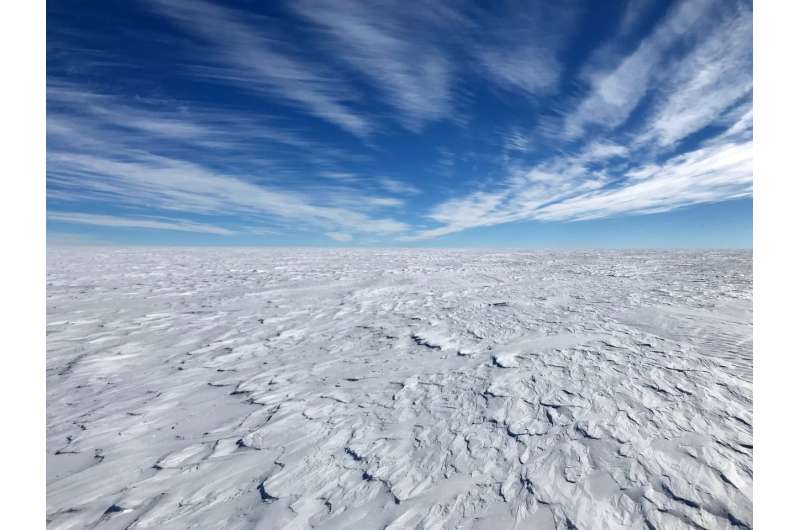Antarctic melting slows atmospheric warming and speeds sea level rise

As the Antarctic ice sheet melts, warming of the atmosphere will be delayed by about a decade but sea level rise will accelerate, according to new research scheduled for advance online publication in the journal Nature.
The study is the first to project how the melting of the Antarctic ice sheet will affect future climate, said first author Ben Bronselaer of the University of Arizona, adding that current climate models do not include the effects of melting ice on the global climate.
The entire Earth will continue to warm, but the atmosphere will warm more slowly because more of the heat will be trapped in the ocean, he said
"Warming won't be as bad as fast as we thought, but sea level rise will be worse," said Bronselaer, a postdoctoral research associate in the UA Department of Geosciences.
Observations show that the Antarctic ice sheet has been melting faster in recent years.
The UA-led team found that by the year 2100, sea level could rise as much as 10 inches more than the previous estimate of approximately 30 inches by 2100.
"No one had looked at the big picture of what Antarctic ice sheet melting means for the global climate," he said.
To figure out whether the melting of the Antarctic ice sheet would affect global climate, the research team modified one of the most current climate computer models to include the ice melt.
Adding the melted ice into the team's model indicated that the global temperature would increase by 2 degrees C (3.6 F) by the year 2065, rather than the year 2053, the team writes.
In addition to slowing warming and increasing sea level, the melting of the Antarctic ice sheet will change precipitation regimes because the tropical rain belt will shift north, said senior author Joellen Russell, who holds the Thomas R. Brown Distinguished Chair of Integrative Science and is an associate professor of geosciences at the UA.
"Our projections indicate the tropical rain belt will shift toward the Northern Hemisphere, making it slightly wetter in the Northern Hemisphere and slightly drier in the Southern Hemisphere than previously predicted," Russell said.
The team's research paper, "Change in future climate due to Antarctic meltwater," is scheduled for online publication in the journal Nature on Nov. 19. A complete list of coauthors and their affiliations is at the end of this release.
The research is part of the National Science Foundation-funded Southern Ocean Carbon and Climate Observations and Modeling (SOCCOM) Project. The National Oceanic and Atmospheric Administration and NASA also funded the research.
Russell leads the part of SOCCOM that is charged with improving how the Southern Ocean is represented in the computer models of global climate. The Southern Ocean is the ocean that surrounds Antarctica.
Researchers previously thought the melting of the Antarctic ice sheet would affect only sea level, not the entire climate system.
To test that idea, Bronselaer ran a climate model with and without the ice- sheet melting included. The team included researchers from NOAA's Geophysical Fluid Dynamics Laboratory in Princeton, New Jersey and from Princeton University. The scientists used NOAA GFDL's climate model called ESM2M and tested the simulation over the time period from 1950 to 2100.
In addition, they set the level of greenhouse gas emissions for the 21st century using the scenario known as RCP8.5, sometimes called the "business-as-usual" scenario.
Russell and Bronselaer were both surprised by their findings. They did not expect the Antarctic meltwater to affect the global climate system.
Ocean circulation moves heat from the equator to the poles. The heat is then released into the atmosphere, Russell said. However, the team's new research reveals that the additional freshwater from the melting ice sheet acts like a lid on the waters around Antarctica and slows the release of heat.
"It's the first new identified feedback on climate in 20 years," she said. "The melting delays warming—it's still warming but it will warm less steeply and give us another 15-year grace period."
Another SOCCOM team that has deployed robotic floats throughout the Southern Ocean that are gathering temperature, salinity, and biological and chemical information about the ocean.
Russell said her next steps are evaluating climate models against the observations from the SOCCOM floats to see what else the models might be missing.
More information: Ben Bronselaer et al, Change in future climate due to Antarctic meltwater, Nature (2018). DOI: 10.1038/s41586-018-0712-z
Journal information: Nature
Provided by University of Arizona





















